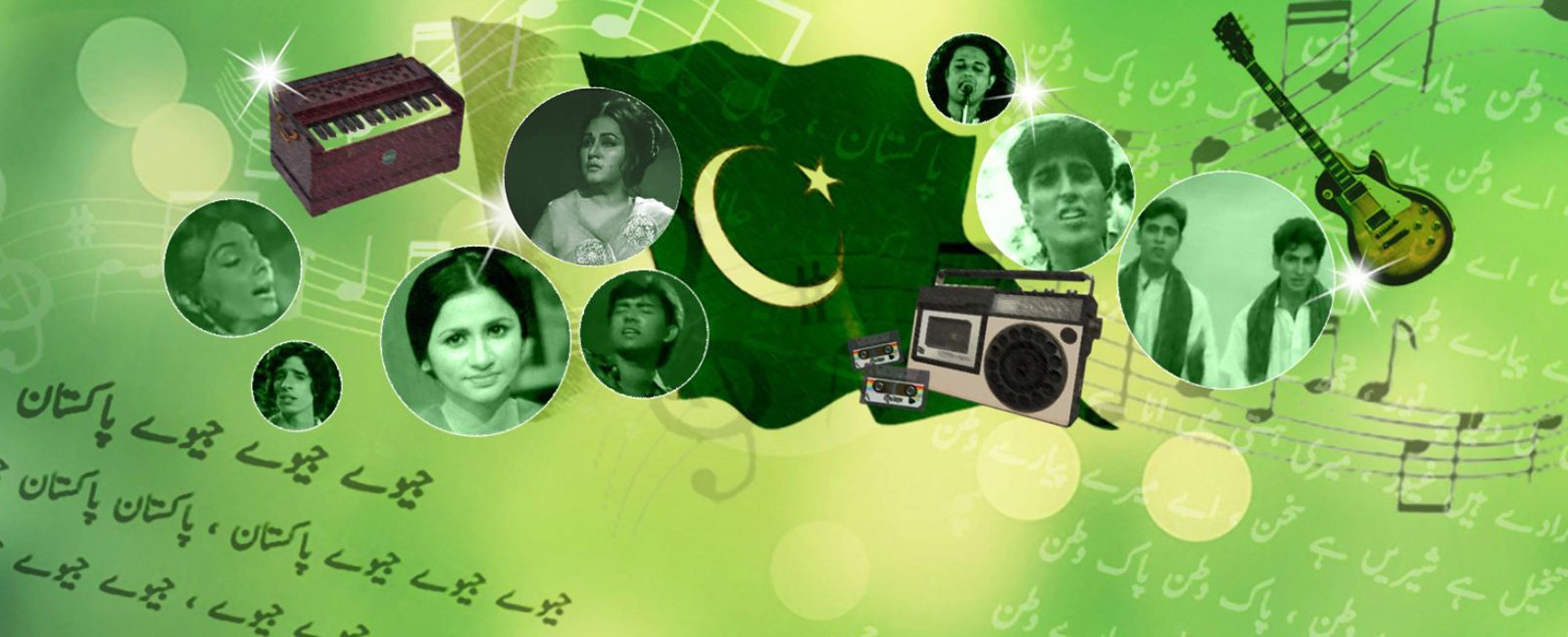Why timeless charm of golden era mili naghmas is hard to duplicate today

A teenager, dressed in a beige uniform and sporting a pair of pigtails, frolics towards the stairs of her school’s main building. With Pakistan’s flag hoisted in front of the St Paul’s English High School’s grand façade, a group of students line up to sing renditions of mili naghmas (patriotic songs) to celebrate Pakistan’s independence. This anecdote is from the late 70s. Every year, whenever Jeevey Jeevey Pakistan, Sohni Dharti or Ik Parcham Kay Saaye Talay plays on the television, mostly around national holidays, my mother reminisces about her younger days.
I am sure we all have a certain mili naghma or mili naghmas that transport us to the days of yore, longing for the past. While some people think nostalgia is overrated; I disagree. Even if for a moment, it leaves you with a bitter-sweet feeling of experiencing an unexplainable sense of joy with a pinch of melancholy and yearning. The numerous melodious mili naghmas and patriotic anthems that many of us have grown up listening to have now become a thing of the past too. Those who grew up in the 90s or earlier would understand the feeling.
Since Pakistan’s independence, the nation has witnessed minor to major transformations in Pakistan’s music landscape, with every decade offering a different style, picking flavours from regional and global music trends. National and patriotic songs, too, were produced and sung adopting these transformations.
But what made the mili naghmas of the past evergreen is something that has kept me curious, as the songs we hear at present might be produced with the best of technologies, but their melodies and lyrics don’t tug at the heartstrings as much as those from the yesteryears do.
Why we cannot help but sing along to the tunes of Shahnaz Begum’s Jeevey Jeevey Pakistan and Sohni Dharti, feel moved by Yeh Watan Tumhara Hai in Mehdi Hassan’s charismatic vocals, Naseem Begum’s emotional tribute to soldiers in Ae Rah-e-Haq Shaheedon, Noor Jehan’s soulful voice in Ae Watan Kay Sajeeley Jawanon, Nayyara Noor’s Wattan Ki Mitti, Nusrat Fateh Ali Khan's Pakistan Pakistan and Amanat Ali Khan’s Ae Watan Pyare Watan, and groove when Dil Dil Pakistan and Jazba Junoon by the country’s revered pop and rock bands Vital Signs and Junoon plays.
My curiosity, hence, made me make a phone call to Arshad Mahmud Sahab — the veteran music composer, singer, actor and former director-programmes at the National Academy of Performing Arts (Napa) — who said: "The songs remain immortal because the hearts of people making them was as involved in the process as their brains".
“Artistic work is never good if your heart is not involved in it. When you listen to Madam Noor Jehan, one can tell it has been sung from the heart. When an artiste sings from their heart, it is obvious to people whether they’ve sung it from their heart or not,” the musician, who composed one of the popular mili naghmas — Hai Meri Sarzameen Roshan, said.
Madam Noorjehan’s powerful vocals for Pakistan’s jawans fighting at the borders during the 1965 war remain unmatched even today, while greats like Mehdi Hassan, Shahnaz Begum and Amanat Ali Khan also sang their hearts out too. Singers from the 70s and later including Nayyara Noor, Naheed Akhtar, Alamgir, Allan Fakeer, Muhammad Ali Sheikhi, the Benjamin Sisters, and several other vocalists, even those from the 90s and early 2000s, gave us memorable music to cherish. It now makes sense why.
Despite technological advances in Pakistan’s music industry with musicians, singers and composers having access to the best tools to improve their craft, Mahmood said it is an artiste’s attitude towards their work which has triggered the transformation.
“It appears there is no heart involved in the music nowadays. Technology is just a tool. It will be used to record a song. I talk about the artiste’s attitude.”
Omair Alavi, a culture journalist based in Karachi, also said that the quality of mili naghmas transformed and "it has been happening for the last 30 years". He shared that before the late 80s, each song would be finalised by a panel at the PTV.
“After 87 or 88, ever since pop music kick-started, there was neither poetry nor anything else, and a song was produced. So when the process of making the song superseded, the quality went down,” he said.
Alavi says he believes the impact of the transformation, due to technological advancement, has been negative, as there is less hard work required as compared to yesteryears when rehearsals were part of the process.
The aforementioned iconic tracks from Pakistan Television’s (PTV) golden era, among numerous others, became symbolic of the country’s identity, and ours too, while their lyrics penned by the poetry greats including Hafeez Jalandhri, Mian Bashir Ahmed, Masheer Kazmi, Masroor Anwar, Muneer Niazi, Jamiluddin Aali and several others resonate with the listeners and fresh in their memories till date.
Commenting on the change in the quality of lyrics, Arshad Mahmood reiterated his opinion on how the involvement of one’s heart is key to a well-produced song.
“A song has three elements when produced by artistes which include the poet who writes the lyrics, the composer who makes the tune and the singer who sings it. A good song is only possible when all of their hearts are involved in the process,” he said.
If there is a lack of heart in the work, then you can write any lyrics, which may rhyme but make no sense. “The lyrics no longer reflect the feelings one has these days.”
I asked Mahmood Sahab if Pakistan’s patriotic songs were now more focused on fuelling hyper-nationalism rather than patriotism.
“Nationalism cannot be hyper. But whatever message or narrative is presented [these days] does not reflect one’s feelings,” he said.
He added that the song Hum Ek Qaum Hain, which he listened to recently, fails to connect with the nation, especially at a time when there were people sitting on political shows on national television, shouting at each other at the top of their lungs.
“The song airs for maybe five minutes, but these fights run at the primetime. What value would the song possess?” Mahmood questioned.
Anwar Maqsood, the country’s illustrious writer and television presenter, said that the mili naghmas written by people back in the day were still in their memories. Later, he added, Jameeluddin Aali took on the responsibility to pen songs for Pakistan.
“Aali sahab wrote very nice songs. [Ahmed] Faraz and [Faiz Ahmed] Faiz did not write mili naghmas. Who is going to write something for the watan [country] in the circumstances today?” he questioned.
Maqsood said the best songs were written during the 1965 war between Pakistan and India. He pointed me towards a book ‘Pakistan Kay Mili Naghme’ compiled by Fatima Surraiya Bajiya and Zehra Nigah and published by the government.
When asked about his feelings regarding the songs from the past and those produced now, Anwar sahab said it was different when Pakistan had recently gained independence, as people were optimistic about a bright future.
“When Pakistan gained independence, we had a new sky, a new land. There was hope that the land would prosper and there would be honesty. Therefore, similar lyrics were written. In the situation we are in today, what can be written? One can only write about saving whatever is left of the country,” he said.
The mili naghma is now “merely a prayer”, but it “lacks culture, manners, sincerity, and love” for the nation, Anwar Sahab added.
Alavi, too, has similar views.
“Lyrics main tou zameen aasmaan ka farq hai (The difference in the lyrics is poles apart). Earlier, the lyrics were written by poets, who wrote words that left one teary-eyed,” he said.
The songs from the past, the journalist added, had lines "which are no longer attempted and no one is writing the words like those in Sohni Dharti, Yeh Watan Tumhara Hai and others".
They songs are “just songs”, which one does not retain and forgets in merely five days after its release, Alavi said lamenting about the work being produced in the recent wave of patriotic songs.
“People are still singing along with songs produced up until the early 2000s. No one tends to remember what came after that, as the lyrics are childish. There is no thought process behind those tracks. The music is mostly rehashed from old songs and there is nothing new,” he said.
The journalist added the music is produced in haste and when something is done in a rush, its result is not as good as something attempted with patience. “This is where the difference lies.”
Mahmood Sahab, when comparing the long-lasting impact of patriotic songs said that those from the past remain “near our hearts”, while “nobody relates” to those being produced now.
Anwar Maqsood sahab, when speaking about some of his favourite mili naghmas, said: "He loves Watan Ki Mitti Gawah Rehna, Iss Parcham Kay Saaye Talay, Shaukat Thanvi’s Chand Roshan Chamakta Sitara Rahey, and others from the past".
“These were the songs we listened to, I don’t listen to those being made now,” he revealed, adding that the old mili naghmas reminded him of the time when he migrated to Pakistan in 1948 with his family.
Alamgir, a beloved singer from the 80s, said he was not in touch with what was going on right now. “I only remember the time when I was there [in Pakistan],” he said, on a very brief call, as he boarded a plane to perform for Independence Day celebrations in the United States.
August for the celebrated musician is a busy month, as he is a regular when performing mili naghmas from the golden PTV times. But this very quick call with him gives us enough insight into the transformation we’re witnessing at the moment.
With an aim to balance our inquiry into the mili naghmas evolution, we tried to reach out to present-day musicians like Sahir Ali Bagga, Bilal Maqsood, etc, but they were a bit too busy to share with us their valuable views.
Pakistan’s mili naghmas from the past are known for their sentimental value towards the nation and its people — something that we no longer experience, and Alamgir sahab’s response was enough to sketch their underwhelming state.
Rabia Mushtaq is a staffer at Geo.tv. She tweets @rabiamush
— Banner and thumbnail illustration by Aisha Nabi




